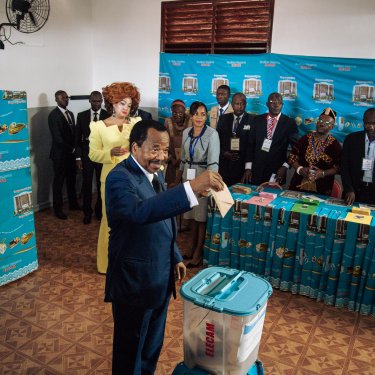Cameroon’s presidential election: RSF denounces press freedom violations

A few days after Paul Biya's reelection, Reporters Without Borders (RSF) assesses the exactions against journalists during the presidential election.
Reporters Without Borders (RSF) deplores the many press freedom violations during this month’s presidential election in Cameroon, in which Paul Biya was reelected on 7 October for a seventh term with 71.28% of the votes, according to the results announced two weeks later, on 21 October.
Several journalists were arrested on 21 October while trying to cover a peaceful march in Douala that was called by an opposition parliamentarian to protest against alleged electoral fraud, and was banned by the sub-prefect. Prince Fogue, a reporter for the daily Le Messager, Reuters correspondent Josiane Kouagheu and Kouagheu’s driver were arrested, taken to different Douala police stations and then released.
“The arrest of these journalists underlines the climate of fear that the authorities have imposed in Cameroon,” RSF said. “By preventing coverage of an election-related opposition demonstration, President Paul Biya’s administration is showing that it does not allow the media to work properly and freely. These latest press freedom violations do not bode well for the situation of journalists and media during President Biya’s seventh term.”
The day the results were announced was also marked by many Internet disruptions. A report by the organization Netblocks quoted Internet service providers as saying access to WhatsApp and Facebook was very restricted if not impossible.
Election-day violence
Many journalists were unable to cover the voting on election day. Many voting stations demanded a special press accreditation for election coverage that had been issued by the communication ministry. This included the voting station at a public school in Bastos where Biya and members of his government went to vote. The prefect in the Biafra region also denied many journalists access to voting stations. The special press accreditation was also required in order to attend hearings on post- election disputes and the Constitutional Council’s announcement of the results. According to the information obtained by RSF, a reporter for La Voix du Centre, Yelva Eyono, was also detained for several hours of the police in Yaoundé.
Press freedom violations were especially numerous in the English-speaking parts of the country. In Buea, the capital of South-West Region, a car belonging to the Cameroon Tribune newspaper was attacked by separatists who wanted to disrupt the election. According to the National Union of Cameroonian Journalists (SNJC), reporters working for Mutations, Le Messager and La Nouvelle Expression were threatened by government officials, who accused them of pro-opposition bias in their reporting.
The authorities have posed a serious threat to journalists during Biya’s previous six terms as president. Last March, a journalist was physically attacked and humiliated by the transport minister’s bodyguards.
Cameroon is ranked 129th out of 180 countries in RSF’s 2018 World Press Freedom Index.



